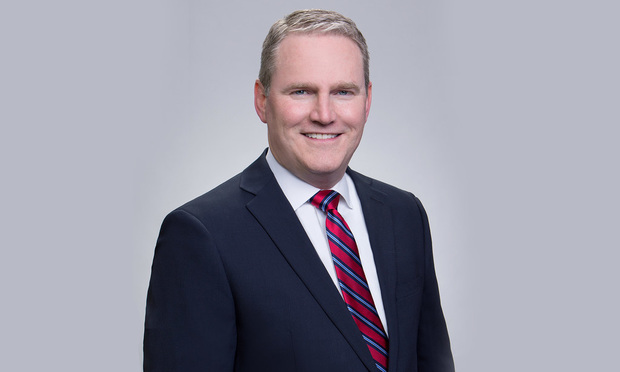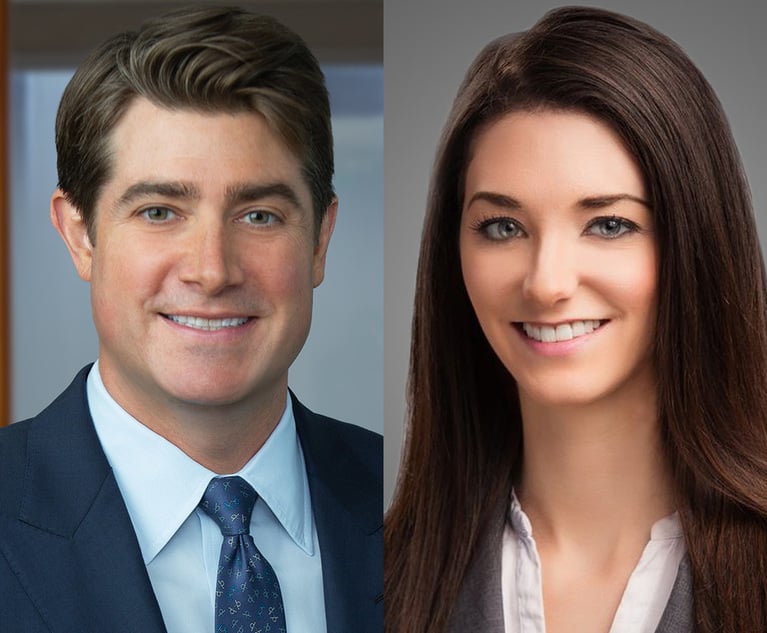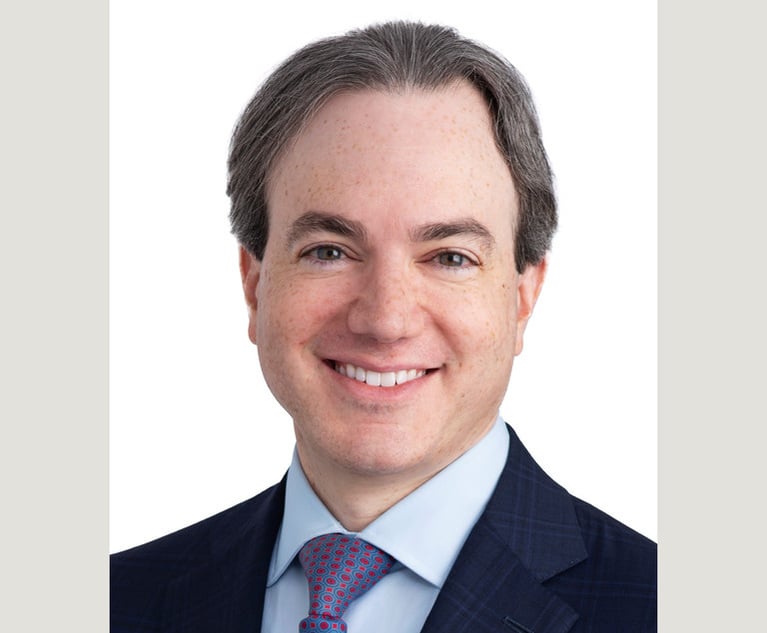New Austin Bar President Launching Lawyer Well-Being Initiative to Help Break Mental Illness Stigma
"We need to break through the stigma that keeps those struggling with mental-health issues from talking about them and getting the help they need," said Austin Bar Association president D. Todd Smith.
July 02, 2019 at 05:11 PM
4 minute read
 D. Todd Smith, founder and managing partner of Austin's Smith Law Group.
D. Todd Smith, founder and managing partner of Austin's Smith Law Group.
In the Austin legal community, lawyer well-being isn't a “generic problem” in the news. It's an issue that's hit attorneys personally, which is why new Austin Bar Association president D. Todd Smith is launching a well-being initiative during his 2019-2020 term.
To realize his vision, the Austin Bar is recruiting members for a new lawyer well-being committee that will develop the initiative and launch programs and events this fall, said Smith, founder and managing partner of Smith Law Group in Austin.
Lawyers nationwide struggle with mental health and substance abuse. A 2016 study in the Journal of Addiction Medicine found that 21% of licensed, employed attorneys qualify as problem drinkers, 28% struggle with depression, and 19% have anxiety symptoms.
Texas Lawyer spoke with Smith to learn about his mission, and get his thoughts on how the program could help Austin attorneys. Here are his answers, edited for length and clarity.
What are the reasons you chose to focus your term on lawyer well-being?
It seemed like we couldn't pick up the newspaper for quite a period there without reading about, on the national level, a lawyer who wound up dying because of suicide or consequences of addiction. It happens in Austin, too. Over the last several years, we've lost—I've not counted—but we've lost several lawyers to suicide and, more recently, to an addiction issue. Most lawyers in Austin know someone at least by the second degree of separation who has been affected by the untimely death of a lawyer because of these issues. They are silent killers.
I'd like to learn about the components of your well-being initiative. What are you planning?
We're going to start with education. We're going to put on luncheon programs or, more typically, continuing legal education programming focused specifically on wellness issues. We will tap into resources like the Texas Lawyers Assistance Program to help us provide programming. One person who is going to wind up on our committee is Chris Ritter, the director of the Texas Lawyers Assistance Program. He's doing a lot with local bars right now.
We also want to do a better job of connecting lawyers in the community. You don't want to just interface with people when you sit on the other side of the table from them. It's better to get to know other lawyers as human beings. It helps intervention possibilities.
What steps will your initiative take to try to break the stigma of an attorney seeking help for mental health or substance abuse issues?
One way is you have to find people who have the courage to speak up about their own issues. Brian Cuban up in Dallas is a great example of that. He lays it all out there and has done a great job being someone who will go out and talk about his own struggle in the hope of other people doing better.
Let's get it out in the open. I'll tell you, that is the hardest thing to do. You have to find someone who is willing to lead in a way that makes themselves a little vulnerable—really, very vulnerable. It takes a lot of courage to do that. I expect that to come out in some of our programming.
Related story:
Minds Over Matters: An Examination of Mental Health in the Legal Profession
This content has been archived. It is available through our partners, LexisNexis® and Bloomberg Law.
To view this content, please continue to their sites.
Not a Lexis Subscriber?
Subscribe Now
Not a Bloomberg Law Subscriber?
Subscribe Now
NOT FOR REPRINT
© 2025 ALM Global, LLC, All Rights Reserved. Request academic re-use from www.copyright.com. All other uses, submit a request to [email protected]. For more information visit Asset & Logo Licensing.
You Might Like
View All
Haynes and Boone Expands in New York With 7-Lawyer Seward & Kissel Fund Finance, Securitization Team
3 minute read
'None of Us Like It': How Expedited Summer Associate Recruiting Affects Law Students and the Firms Hiring Them

Big Law Firms Sheppard Mullin, Morgan Lewis and Baker Botts Add Partners in Houston
5 minute read
Trending Stories
- 1Munger, Gibson Dunn Billed $63 Million to Snap in 2024
- 2January Petitions Press High Court on Guns, Birth Certificate Sex Classifications
- 3'A Waste of Your Time': Practice Tips From Judges in the Oakland Federal Courthouse
- 4Judge Extends Tom Girardi's Time in Prison Medical Facility to Feb. 20
- 5Supreme Court Denies Trump's Request to Pause Pending Environmental Cases
Who Got The Work
J. Brugh Lower of Gibbons has entered an appearance for industrial equipment supplier Devco Corporation in a pending trademark infringement lawsuit. The suit, accusing the defendant of selling knock-off Graco products, was filed Dec. 18 in New Jersey District Court by Rivkin Radler on behalf of Graco Inc. and Graco Minnesota. The case, assigned to U.S. District Judge Zahid N. Quraishi, is 3:24-cv-11294, Graco Inc. et al v. Devco Corporation.
Who Got The Work
Rebecca Maller-Stein and Kent A. Yalowitz of Arnold & Porter Kaye Scholer have entered their appearances for Hanaco Venture Capital and its executives, Lior Prosor and David Frankel, in a pending securities lawsuit. The action, filed on Dec. 24 in New York Southern District Court by Zell, Aron & Co. on behalf of Goldeneye Advisors, accuses the defendants of negligently and fraudulently managing the plaintiff's $1 million investment. The case, assigned to U.S. District Judge Vernon S. Broderick, is 1:24-cv-09918, Goldeneye Advisors, LLC v. Hanaco Venture Capital, Ltd. et al.
Who Got The Work
Attorneys from A&O Shearman has stepped in as defense counsel for Toronto-Dominion Bank and other defendants in a pending securities class action. The suit, filed Dec. 11 in New York Southern District Court by Bleichmar Fonti & Auld, accuses the defendants of concealing the bank's 'pervasive' deficiencies in regards to its compliance with the Bank Secrecy Act and the quality of its anti-money laundering controls. The case, assigned to U.S. District Judge Arun Subramanian, is 1:24-cv-09445, Gonzalez v. The Toronto-Dominion Bank et al.
Who Got The Work
Crown Castle International, a Pennsylvania company providing shared communications infrastructure, has turned to Luke D. Wolf of Gordon Rees Scully Mansukhani to fend off a pending breach-of-contract lawsuit. The court action, filed Nov. 25 in Michigan Eastern District Court by Hooper Hathaway PC on behalf of The Town Residences LLC, accuses Crown Castle of failing to transfer approximately $30,000 in utility payments from T-Mobile in breach of a roof-top lease and assignment agreement. The case, assigned to U.S. District Judge Susan K. Declercq, is 2:24-cv-13131, The Town Residences LLC v. T-Mobile US, Inc. et al.
Who Got The Work
Wilfred P. Coronato and Daniel M. Schwartz of McCarter & English have stepped in as defense counsel to Electrolux Home Products Inc. in a pending product liability lawsuit. The court action, filed Nov. 26 in New York Eastern District Court by Poulos Lopiccolo PC and Nagel Rice LLP on behalf of David Stern, alleges that the defendant's refrigerators’ drawers and shelving repeatedly break and fall apart within months after purchase. The case, assigned to U.S. District Judge Joan M. Azrack, is 2:24-cv-08204, Stern v. Electrolux Home Products, Inc.
Featured Firms
Law Offices of Gary Martin Hays & Associates, P.C.
(470) 294-1674
Law Offices of Mark E. Salomone
(857) 444-6468
Smith & Hassler
(713) 739-1250






